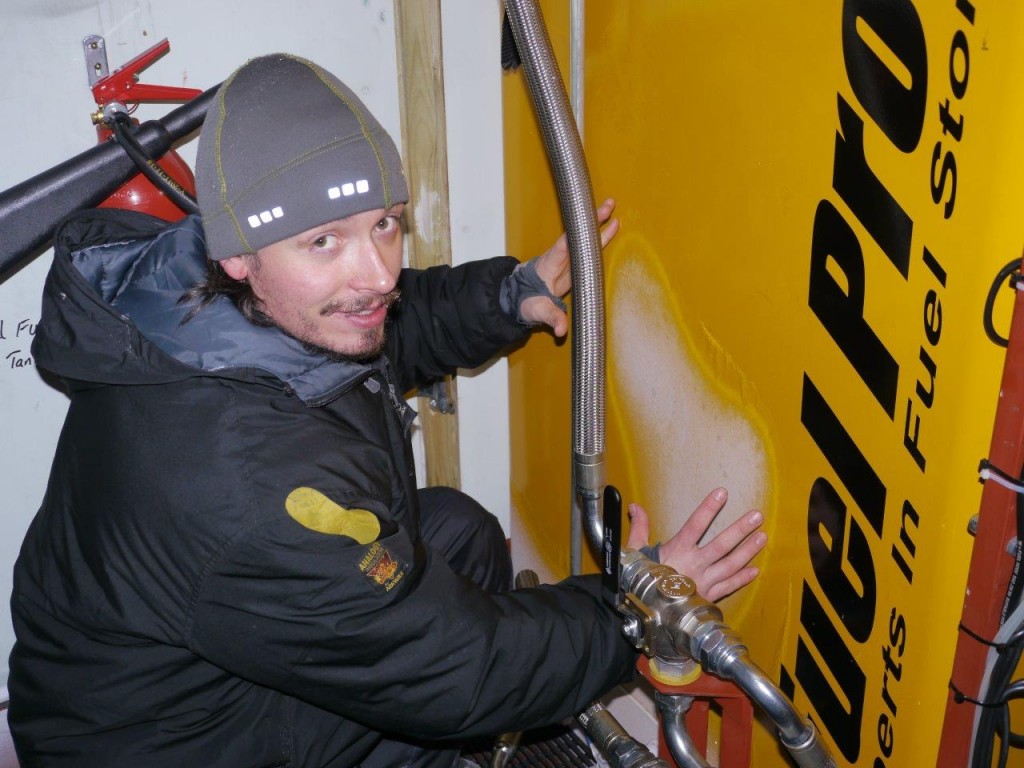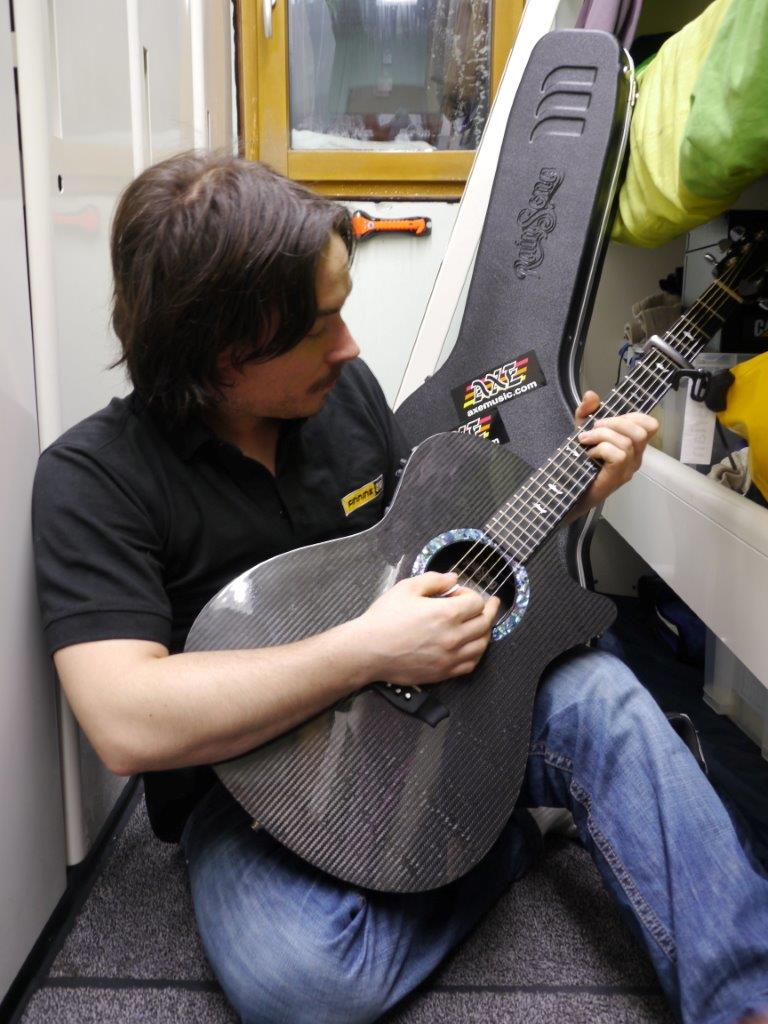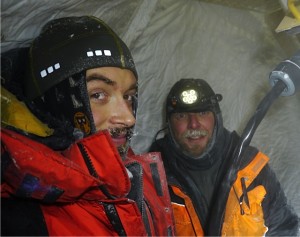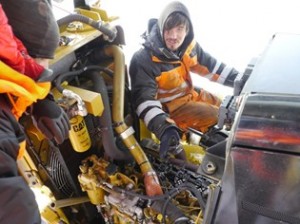The Joanna Lumley Interviews: Spencer Smirl
 Q1. What was your favourite subject at school?
Q1. What was your favourite subject at school?
My favourite subject was always math. I was never very creative in my youth and with math, everything was always constant, you just had to fill in the blanks. Math was always the easiest for me to do well in, that is probably another reason why it was my favourite .
Q2. What make was your first car?
My first car was a blue 1989 Ford Grand Marquis. It was about 6 meters long with a 5.0 liter V8. I would have been lucky to get 10mpg. Fortunately when I started driving at 16, gasoline was just over 30 cents per liter. I don’t think I would have been able to afford to fuel such a land yacht at that age with today’s gas prices.
Q3. When were you last afraid?
Yesterday. I wouldn’t call it afraid, more worried. As the machines haven’t been operated since 6th June, I worry that they will cause problems. In my experience, after a long sleep in the cold, it is quite common for minor leaks to develop within various systems. A slow and gentle warm up is very crucial. At our current location and in our current weather conditions, if we did have to take on any major repair we would be unable to lower the tents due to the excessive winds. It would be very dangerous for us to attempt any major repair in temperatures below -40C without the aid of the tents. With the excitement of heading home, it will be very critical to keep our heads and not rush our return.
 Q4. What is your favourite band/music/composer?
Q4. What is your favourite band/music/composer?
As a musician myself, I enjoy all types of music. It is very hard to choose a favourite type or a favourite group. Lately, I have been listening to a lot of “Black Tide” and “Times of Grace”, they are both American heavy metal groups but they write a lot of slower ballads and have awesome guitar riffs.
Q5. Are you superstitious? Do you have a mascot or lucky charm?
I am a just a little superstitious. I think I have approximately a dozen lucky charms with me. Mostly small little trinkets I have collected over the years, each of which has a connection to a strong event or tragedy that has occurred in my life. Some were given to me specifically for this trip; family, friends, and even co-workers gave me little devices of luck to encourage a safe return. Steve and Wendy Ives, friend and work colleagues from Finning UK in Cannock, England, gave me a small teddy bear with a shamrock on his belly. It was placed on the dash of Seeker before he was off loaded from the Agulhas to the ice so long ago and has been there providing good luck to man and machine ever since.
Q6. What was you earliest ambition?
I always wanted to be a racer, a racer of anything. To go fast for a living is all I wanted to do. Motocross would have been my first choice. I never would have thought in a million years I would one day be racing a bulldozer on jet fuel across Antarctica. It isn’t fast by any means but I guess you could say I got my wish.
Q7. In what place are you happiest?
I am at my happiest floating through the trees on a cloud of fluffy white powder. I have been snowboarding for almost 20 years. Even after this seemingly endless winter down here, with all the challenges and frustrations, I still choose snow over sand. I can’t wait to get home and spend an entire winter making up for a lost season in the Rockies.
Q8. What do you miss most about home?
Most of all I miss my family and being at home in Peace River, Alberta. I had lived in Calgary, Alberta for six years leading up to the prep for the expedition. In those six years I think I would only come home to the Peace Country once or twice a year. After the trip to Northern Sweden with Sir Ranulph and his selections team in January 2012, I had moved back to Peace River to spend more time with close friends and family before leaving on the expedition. A lot of my days in 2012 were spent in Cannock, however, prepping the two Cat D6N’s for the expedition. I didn’t get to spend as much time at home as I would have liked. In my high school years and the few that followed before I left Peace River to move to the city, I never really spent much time with my family and what time I did spend was usually spent fighting, especially with my brothers. After a trip such as this one, you miss a lot of things, little things, things you spent most of your life taking for granted. Out of all the things I miss, the moment I look forward to the most is getting home for Christmas and seeing my parents and my two younger brothers.
Q9. What has this experience taught you about yourself?
For this entire expedition, we have been at the mercy of Mother Nature. The weather has had a key role in dictating everything we do down here. The more you try to plan and control your situation the bigger the disappointment when the climactic conditions fail to co-operate. I have had to learn a far greater form of patience than I have ever known.
Q10. Do you think you will ever go back to the Antarctic?
If the opportunity ever comes for me to return, I would jump at the chance. I would really like to see more of the continent. I think I would prefer to experience any future visits in summer though!
Q11. What is the most beautiful thing you’ve seen since arriving in Crown Bay in January?
It is a close tie. The views while traveling back down through the “Gunnestadbreen” pass in the Sor Rondane Mountains after our fuel depot in late February where amazing. We were fortunate to have clear sunny weather that day and you could see for miles up and down the mountain range. In January, when we arrived at the coast of Antarctica and saw Crown Bay for the first time, is still one of the top beauty shots in my mind. Seeing the coastline of the continent from the decks of the Agulhas will likely be one of the best experiences of my life. The ship smashing its way through the pack ice as it entered the bay; the water around us was as still as glass. Curious penguins slid along on the icebergs and followed beside the ship. We even got to see a couple of massive bits of shelf ice break free from the coast and crash into the ocean below. If I had money coming out my ears, I think I would hire a ship and sail the entire coastline of Antarctica.
 Q12. If you could eat any meal right now, what would it be?
Q12. If you could eat any meal right now, what would it be?
There is this little Mexican restaurant back in Peace River, “Su Casa Café”. They serve authentic Mexican dishes which would otherwise be very uncommon in small town, Northern Alberta. The staff is small so they don’t prepare the entire menu every day. You have to learn what days are what menu items, it’s worth the effort. Every Friday for lunch they serve a shrimp mango soup that is probably the best soup I have ever had. If I could have any food magically appear in front of me right now, I would wish it to be that.
Q13. As one of the two drivers, you have certainly had your fair share of technical challenges during this expedition. What has been the hardest and why?
Shortly after passing the final way point, some 25-30kms north of our current location, we came to a steep bit of blue ice. The surface was almost completely blue ice, bar for a few scattered patches of snow. We had driven the Cats to the top first without cargo to inspect for any crevassing and get a feel for the hill. We came back down and hooked Rover up to the drawbar of the living caboose. To the front of Rover’s blade we attached the winch cable off Seeker. We would need to pull this hill in tandem. Even at 20 tonnes I anticipated a struggle. With just a little bit of slippage we made the summit. The next load was the Science Caboose/ Storage Caboose combo, this load was a little heavier at nearly 30 tonnes. With how well the Living Caboose was towed up, I thought we would be able to safely increase the load and decrease the number of trips we would have to make. I was wrong. A little more than half way up, we both spun out. It would be impossible to back down without “jack knifing” the two sledges behind Rover. Our only option was to spool out Seeker’s winch line as I advanced up the hill, and once at the limit of the cable, try and reel in as Rover attempted to regain traction on the hill and begin to climb. It took three stages of winching before we were both able to gain traction and drive the rest of the hill. As a mechanic, not an operator, this was a new technique to me. I have a lot of experience winching and towing 4X4 vehicles out of mud holes, but this was a completely different skill. Our newly-learned winch technique safely advanced every piece of both ice trains to the top of this hill without incident and although it was absolutely terrifying when we first spun out, as we repeated the climb, the path deteriorated and even though we had reduced our load to 15 tonnes, we had to winch every single one. The repetition made it less stressful. As I mentioned in the beginning, this hill is 25-30kms north of our current location. This means we are going to have to conquer this slope once again, only this time, it will be going down. Down is always harder. We will have to take each piece down one at a time with a Cat at either end. It is going to take a lot of control and a lot of patience. It will likely be the most difficult and the most dangerous of our journey home.
 Q14. If you ever got another chance to cross the Antarctic in winter, would you do it and why?
Q14. If you ever got another chance to cross the Antarctic in winter, would you do it and why?
If I was ever offered the opportunity to cross the Antarctic in winter again I would have to say yes, especially if it hadn’t been done yet. Why? Because I must be crazy. Seriously though, I would do it again, to prove that I could. I failed at it this time, if I could still have a chance of being the first Canadian to cross the Antarctic continent in winter, I would jump at the opportunity. Although this expedition was faced with many frustrations and challenges, we have learned from these and could now better prepare for a successful crossing.
Q15. Which three words best describe your experience during this expedition?
Crevasses, Wind, Patience.
Comments are closed

There are 2 comments